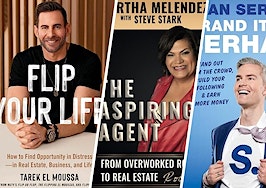In my early 30s, I topped the charts for selling more homes than any other real estate agent in San Francisco. If I do say so myself, this was a pretty impressive achievement for a young woman who started in the business with no network, no money, no sphere of influence, nor a resume beyond a college degree in Latin American Studies.
In truth, I was burnt out and ready to quit the business. My first decade in real estate was full of workaholism, competitiveness and insecurity, unhealthy eating and way too much red wine. It showed in my skin, my waistline and increasing cholesterol levels.
Something inside of me wanted more. I got into real estate to build a great life with economic prosperity, yes, but also one filled with travel, personal time, tennis, skiing, walks with the dog and, eventually, children.
After briefly exploring other careers and realizing that I did not want to start from scratch, that there was a lot about real estate that was enjoyable, and that I was darn good at it, the process of inner reflection began. Because I am from Northern California, this meant everything, including therapy, coaching, tarot cards and “running my energy” with a guru in Marin County.
How could I be so successful on the outside and yet so unfulfilled? Was it totally and downright impossible to be a “top producer” and have a more or less balanced life with healthy boundaries?
Why do we, as agents, give away our value, strategy and services for free? At the top of my game, I was burned out from all of the free consulting and ready to quit. But I found a new way, with the help of former FBI hostage negotiator Chris Voss and a toolkit of advanced emotional intelligence, situational intelligence and tactical empathy. It saved my career, and my goal is to teach other agents there’s a better way than hustling, sacrificing and giving it all away for free.
The a-ha moment
Back in 2018, a friend and fellow agent in San Francisco suggested we go to LA to hear Chris Voss and Steve Shull talk about Voss’ book, Never Split the Difference. I had never heard of either of them, but I decided to go on a whim.
I sat there at the Skirball Center, completely stunned. Voss articulated what I had always suspected: People are not making rational decisions when hiring an agent, and the playing field is not even.
Almost like one of those “awakening” moments, literally in an instant, I realized what my intuition was trying to tell me for years. It was not my actual business that caused my burnout. For the most part, I’d had wonderful clients and positive experiences. What was killing me was all of the unpaid work and mental labor in pursuit of buyers and sellers who would never hire me in the first place.
Have you ever had an experience competing for a listing where you were the more qualified choice, but they hired someone else, and you could not understand why? You’re the better agent with a stronger track record (and a nice person, too). I used to joke that they hired the other agent because they just liked their shoes better than mine. It always seemed so random and not based on merit.
Why hire their old buyer agent or family friend who sells a fraction of the homes you sell to manage the sale of their most valuable financial asset? They wouldn’t hire a surgeon, an accountant or a litigation attorney this way. It’s almost as if they’re just using you for an expert second opinion and free consulting to confirm what their friend in the business or former agent is telling them.
Let’s break it down
Here’s how the traditional process for obtaining a new listing typically works:
- The call or email comes in.
- You talk or email briefly to book the listing appointment, which is often scheduled for an evening or weekend convenient for the “client.”
- You cancel whatever personal plans you had for that time.
- Maybe you get a little bit of information about their situation upfront, but for the most part, you plan to dig into the details in person.
- You prepare a custom marketing presentation and CMA.
- Maybe you even make a snazzy binder or iPad Prezi.
- You get dressed up.
- You drive to the house.
- You spend anywhere from 45 minutes to 2 hours at the home going through your materials, walking around the property, making suggestions about improvements and property prep to increase their ROI, and trying to build rapport.
- At the end, they thank you for your time and all of the valuable information.
- They say they have a lot of thinking to do and will get back to you with their decision.
- You leave feeling pretty good because it seemed to go so well. You were talking most of the time while the sellers nodded, which feels really good.
- You drive home and begin your follow-up process: a phone call (or three), a text message, maybe an email, or even a handwritten note or gift.
Then, you either get the listing, or you don’t. If you don’t, you feel bad and wonder what you did wrong. Maybe the other guy gave a higher price? Maybe she charges a lower commission? Some of us sign up for more torture and ask the sellers for feedback so we can improve for next time.
Depending on how busy you are with other deals, you carry around the disappointment for a few days, maybe longer. You ask your manager or your real estate coach for advice. They tell you it’s a numbers game. They tell you to work on your presentation.
Sound more or less familiar? This was my process for 15 years. With my internet presence, I get a lot of calls from strangers. I went to a lot of appointments — a lot.
And it was making me freaking miserable. I felt used and abused. It was draining my energy and life force. Sounds dramatic, but there’s some truth to it if you’re being honest with yourself.
The new way
What if you could throw that entire process out of the window and figure out in 10 minutes (or even less) via phone or video call (aka Zoom), within 90 percent or more likelihood, if you were going to get the business or if they were likely to hire someone else?
What if you wait for a commitment before providing detailed information or services? What if you got the listing signed before going to the house?
What if you only provided value if the seller is:
- Serious about selling
- Serious about selling with you
In 2019, I stopped going on listing appointments. I stopped giving away “free consulting,” the marketing and pricing presentation that most agents do before there is a commitment to work together.
Here is what my business looks like now:
- I am paid my full fee every time.
- Buyers sign an exclusivity agreement every time.
- No more free consulting. I start the process after there is a mutual commitment to work together.
- Buyer and seller presentations have morphed from the typical 1- to 2-hour affairs (plus prep, travel time and follow-up) to a 10-minute screening call via video chat or telephone. I go to the property after a commitment to work together and almost always end up with a signed listing agreement. (My regular stager thinks this is hilarious. When we arrive at the property, we both see it for the first time.)
- I work nights or weekends only when I want to. The vast majority of the time, work is done during regular business hours.
- I can tackle any tricky conversation or situation with ease.
- I have time off for myself, my family and my hobbies.
- I have mental, physical, emotional and financial wellness.
- I enjoy my clients, my business and my life way more than ever.
- I am a better agent for my clients because I focus my energy on those who deserve it.
Agents waste too much time going on listing presentations they won’t win. Once you stop the insanity, your world will change, and you’ll have a stress-less real estate business.
No more dog and pony shows (otherwise known as the listing presentation) for people who would never hire you in the first place. This is just one example of the power of advanced situational and emotional intelligence in your real estate career. There are many, many more.
The lesson is that you can make changes, regain control and stop struggling with burnout. Lean into your authentic self, set boundaries and be patient. This kind of radical change takes time.
The bad news is that it is not as easy and straightforward as it appears. It took me years of practice to learn how to hold my boundaries. If you’re interested in learning more about tactical empathy, situational intelligence, advanced emotional intelligence and how to implement them in your real estate business (and life), I’ll expand more on what I’ve learned in my next article on Inman.
Danielle Lazier is a broker associate with Vivre Real Estate powered by Side and a communications and negotiations performance coach with Stress-Less Sales in San Francisco. Connect with her on Instagram and Linkedin.













